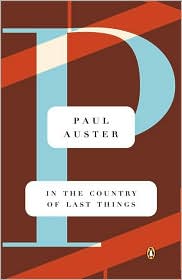 I picked this book as my choice in our Ramblekraft book club. Obviously the post-apocalyptic theme intrigued me although I had heard of the author through meezlys reviews of The Music of Chance and The New York Trilogy.
I picked this book as my choice in our Ramblekraft book club. Obviously the post-apocalyptic theme intrigued me although I had heard of the author through meezlys reviews of The Music of Chance and The New York Trilogy. [We now have a review up from meezlyblog]
[And another from The University of Crumbolst]
In the beginning we meet Anna Blume who has crossed the Atlantic to find her brother, a missing journalist. This information is slowly parsed out over the early section of the book as the City is described. The City is vast and unforgiving. Unemployment is massive, scavenging rife and death easy. Something as simple as the weather can kill you or you can just give up and go to the Euthanasia Clinics (a cool nod, I thought, to Make Room, Make Room/Soylent Green). Everyone who is surviving has to work to survive.
Anna's search recurs but she mainly just lives. The daily struggle of scavenging takes all of her will. The novel feels like one of those POV shots where Anna just takes up with whatever slightly more positive thing comes along. A strange interlude occurs where she lives with a madman and his wife (weird ending) followed by something of a romance in the ruins of a huge public library. Each encounter builds on the last but not in the way that you can immediately put your finger on.
I really enjoyed the concept of the real annihilation of the City. There never seems to be anything produced with everything scavenged or sold like the entire interior of Victoria's house. Entire blocks will just be razed for reasons that are only a rumor. Even the description of trying to navigate the roads which are crumbling and buckling.
For me the theme of this novel was hope. Survival is based on having hope but hope in the story it is almost unreal. Anna never really sees a future or escape from the City. They are certainly always options but always there are barriers: not enough glots, have to care for Samuel. We see that those who give up hope like the shipbuilders wife quickly wither away. The last section of the book obviously is much more positive but I never quite felt it was tangible.
From what I had heard of Auster, I was expecting a book that took the PA genre and used it as hook to hang some modern literature gymnastics: deconstructing this or making it a "meta-sf" that. Similar to Cormac MacCarthy's The Road though, the story remains respectful to the canon of the apocalyptic. In many ways I found it a little like some of the early British PA fiction from Ballard or John Christopher. The human condition is examined in light of a fractured world and we don't explicitly have to know what the destruction is to see it's effects on people.
The narrative is not so driven but I enjoyed the depth of the descriptions. Anna's life was so relentlessly brutal, she persevered and yet I never fully came to sympathize with her. Nevertheless the theme of hope is finally realized in the end and when I thought more about it afterwards I hoped that they all make it somewhere better.

4 comments:
my review is up!
I guess we wait until everyone else has posted before we start discussing?
Two interesting and insightful reviews so far posted. I see both sides of your point on the act of scavenging. You want to know more because it seems like it is a profession with many interesting details. However, there is something elegant (or easy) about not having to fill in the details. Imagination!
@beemused There were many cool little asides like the Assassination Club. I thought you cold also have a story on Boris.
I am pretty sure that Auster meant that she crossed the Atlantic to NY. He never gives any details but the geography seems correct and he is a Brooklyn writer.
@crumbolst The change in perspective got me a bit in the beginning as well. I had to stop thinking of it as a letter occasionally. I think I too noted the change from the first section to the final section of the book. There were some 40 pages initially devoted to the description of the City before Anna's story came in.
I agree about the hope theme. Hope and total exhaustion.
Crumbolst - totally agree with your points, esp. regarding sexuality and survival.
I thought the part where Anna half-strangles bottle-ship guy when he tries to rape her was both awesome and portrayed the sex/survival thing well.
If you're interested in reading more Auster, you might enjoy The Music of Chance. I recommend that one over the NY Trilogy only because it's more accessible and less weird.
Mt Benson - your review makes me want to check out The Road, which has been sitting on Olman's on-deck shelf for god knows how long!
I was also thinking more about impermanence, and how that relates more to hope. This theme has been in every book I've read of his, and his characters are always going thru some loss, whether it's identity, memory, and/or possessions. I think the PA and dystopian setting helps to set the theme for Total Overwhelming Impermanence which boils down the idea of Hope in its most pure and basic concept.
Post a Comment